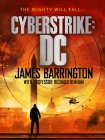Cyberstrike, James Barrington [short story to read .TXT] 📗

- Author: James Barrington
Book online «Cyberstrike, James Barrington [short story to read .TXT] 📗». Author James Barrington
The problem that Sadir had faced when he’d been looking for a suitable location just over two years earlier was that he needed it to be no more than about an hour’s drive, preferably a lot less, from Capitol Hill, and it had to be big enough and sufficiently secluded for the operation he had planned to be undetectable. He also needed either a workshop on the premises or a suitable building where the machinery he needed could be installed, which further limited his choice. And, again because anywhere that close to Washington was prime commuter belt, the houses in every other town he’d looked at had been similarly priced. Eventually, and after an exchange of somewhat testy emails with the sponsoring elders in Iraq, a detached house sitting on about an acre of ground on the northern outskirts of Damascus had been identified and then rented by a proxy, a long-term expatriate Iraqi well known to, and completely trusted by, the elders.
Sadir had taken possession of the property and handed the keys to the three men he had already recruited to carry out the work, made sure that they had all the tools, equipment and raw materials that they needed and left them to it. He’d kept in regular touch with them by email, both parties using draft emails and a web-based account to avoid compromise and detection, but with the deadline now approaching he knew he would have to visit the house in person once again to ensure that absolutely everything was as ready as it could be.
If they’d met a last-minute snag or problem that could delay completion of the weapons it was essential that Sadir knew about it so he could adjust the timetable accordingly.
That afternoon his Honda was on its usual floor in a multi-storey car park on 19th Street and not too far from his hotel, but Sadir certainly wasn’t going to walk there and climb into it, because the operation was far too important for that. It was crucial that nobody had any idea of who he was or what he had planned until the moment when everybody would know because their world would be crumbling around them.
Instead, he followed his usual circuitous route to the car park, making his way in what amounted to a couple of rough circles using public transport, which meant several taxi rides and unnecessary visits to hotels and stores where he was able to enter through one door but leave through another. And because the traffic in Washington D.C. was always heavy, the streets were a virtual sea of red-painted cabs, making the task of anybody following him even more problematic.
The colour scheme – a uniform bright red bisected by a curved grey stripe running from the front wheel arch of each vehicle and tapering towards the rear wing, within which the name of the taxi company and its contact number were displayed in black lettering – had been introduced in 2013 by the DC Taxicab Commission to standardise the appearance of the cabs serving America’s capital city. The taxis were nothing like as iconic as the ubiquitous yellow cabs that prowled the streets of New York in vast ill-tempered hunting packs, but at least it made identifying a taxi easy enough.
Twice when his chosen vehicle had come to a dead stop in the snarled-up traffic at yet another red light, Sadir had paid the driver what he owed and climbed out of the cab in the road. Then he’d waited on the sidewalk scanning the traffic to make sure that nobody else did the same thing, before finding another cab going in the opposite or at least in a different direction. To further confuse any possible surveillance, Sadir also took one of the Metrobus DC Circulator vehicles for a part of his journey.
The whole of his counter-surveillance checks took over an hour, as usual, and at the end of it he was left with a roughly quarter of a mile stroll to reach the parking garage from where he’d told the last taxi driver to drop him off. Even then, he didn’t enter the building but stayed on the opposite side of the road and took a seat at one of the outside tables in the coffee shop almost directly opposite the multi-storey. The fact that there was a cafe with an uninterrupted view of the garage was one of the main reasons why Sadir had chosen that location.
He ordered and paid for a coffee and a pastry and took his mobile and a novel from his pockets. For the next twenty minutes he watched the exit from the multi-storey without at any time appearing to look directly at it, not least because he was more interested in anybody who might be waiting on either side of the street than anyone driving out of the building.
But he saw nobody who raised his suspicions and finally decided that it was safe for him to move. He waited for a gap in the traffic, crossed the road and walked inside the building, but took the stairs rather than the lift as a final check that he was still not being followed. He did a complete circuit of the level where his Honda was parked before approaching the vehicle.
Even then he was cautious. He was very aware that motor vehicles of all sorts had enormous potential as killing machines – the forces of radical Islam had frequently made extensive and lethal use of





Comments (0)